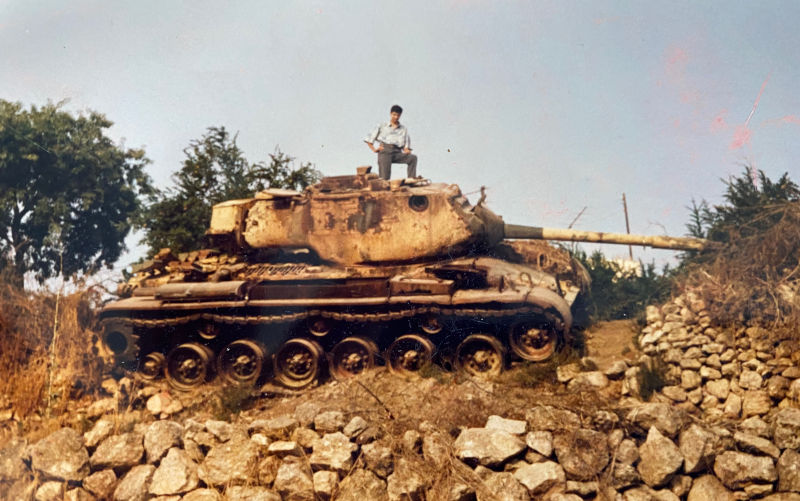In Lakemba, an answer to one of Palestines secrets is found
June 24, 2023
Late April, at my sons decree, we went to the Ramadan Night Markets in Lakemba. A visit that would lead to a decades-old mystery being solved. A story that sheds light on the displacement and pain we have experienced since our world was torn apart by Zionism 75 years ago.
A dear friend of mine was at the markets too, and introduced me to a dear friend of his, Iyad. When Iyad mentioned that he comes from my hometown of Jenin - the target of horrific Israeli airstrikes this week, we exchanged family connections and which part of Jenin we come from, as Palestinians always do.
I told Iyad our family home in the city had two unique features: a Jordanian tank in the back yard and an 80-metre-high United Nations communications mast on the roof, the tallest structure in Jenin at that time.
One morning in the mid 1980s, residents of Jenin woke to see a giant Palestinian flag flying from the mast. It could be seen from every corner of the occupied city, except ironically by those inside the house, usually one woman in her seventies: Umm Khaled, my paternal grandmother.
Like so many Palestinians who experienced the Nakba, her offspring left under economic pressure or the shadow of the occupiers gun. Umm Khaled never contemplated such a step. Her intense love for her children, who all ended up living in Kuwait, never trumped her bond to her home and homeland. These trees are my children too, she always told us.
Then as now, displaying the Palestinian flag was criminalised, part of Israels unrelenting effort to erase everything that speaks of Palestine and its people.
Early in the morning, a large contingent of Israeli soldiers arrived, but neither the soldiers nor anyone else was willing to shin up a mast atop one of Jenins two mountains. My uncle - arriving only the night before to visit his mother - was detained, and the army brought in machinery to tear down the structure. Hours later, following a lengthy interrogation by a military commander called Ehud Barak, my uncle was released and both the flag and the mast were gone.
Only the question remained: who was the hero who had raised the flag?
But this tale of mystery, which I had told often over the years, was about to be completed. I know your house well, Iyad told me, and I remember who put the flag up.
The hero with the courage to make a dangerous climb under the noses of the Israeli military and raise our peoples flag had been anonymous to everyone for 35 years. But not to Iyad. It was Omar Nayef he told me, Allah yirhamoh - God bless his soul.
Having scaled such heights, Omar also found the depths of the Palestinian experience. Charged over the murder of an Israeli in Jerusalem, he was convicted by the occupations military courts - which find more than 95% of Palestinians brought before them guilty - and he was sentenced to life in prison.
He managed to escape and begin a new life and family in Bulgaria, only to find himself fighting extradition to Israel in 2015. Seeking refuge in the Palestinian embassy in Sofia, he was found dead in its grounds on February 26, 2016, far from his homeland, in circumstances which remain unexplained.
This year, world leaders - including Australian ones - have been congratulating Israel on the 75th anniversary of its independence. They choose to ignore the fact that this independence comes at the expense of the displacement and oppression of millions of Palestinians. How different this is to the way they see the occupation and displacement currently being inflicted on Ukrainians.
But these days many people, including the younger generation in the West, are no longer willing to condone Palestine being the exception when it comes to freedom or justice, or to tolerate the unapologetically racist policies and leaders of the Jewish state.
International human rights organisations are at last calling Israels rule over Palestinians by its proper name - apartheid. Global movements are actively organising in response to the call of Palestinian civil society by boycotting Israeli products and institutions. Claims that this groundswell of support for Palestinian rights is nothing more than revived antisemitism are part of the same skewed vision we see from many world leaders.
Earlier this month, the Australian Greens published their resolution on Palestine, recognising that Israel is practising the crime of apartheid against Palestinians and reaffirming their support for Palestinian rights.
The Greens principled and progressive position is far superior to the one being contemplated by the Labor government, recognising the state of Palestine. This symbolic recognition wont end Palestinians exile and oppression tomorrow, it is nonetheless a step in supporting their right for self-determination and making Israel more accountable for the crimes committed against them.
Decades ago, Omars daring act gave Jenin a feeling of liberation, however fleeting. This year, in the heart of Lakemba, it gave me a renewed pride in the unbreakable bonds of identity that connect Palestinians to each other and their beloved homeland. It is about time for the Australian government to also find the courage for its own daring act, giving all Palestinians a feeling of liberation, however fleeting!
